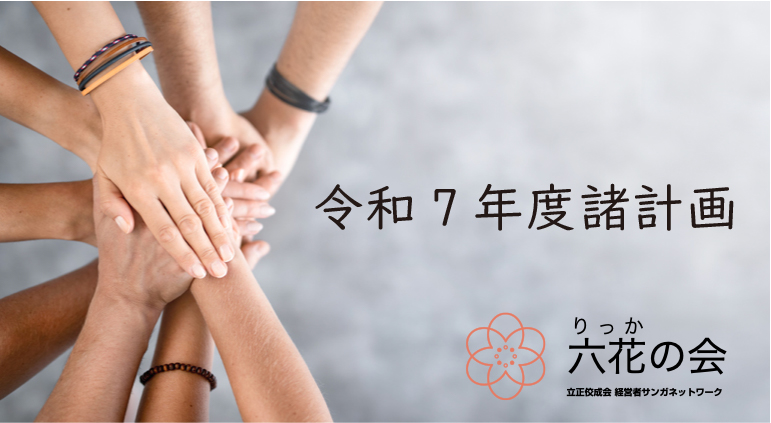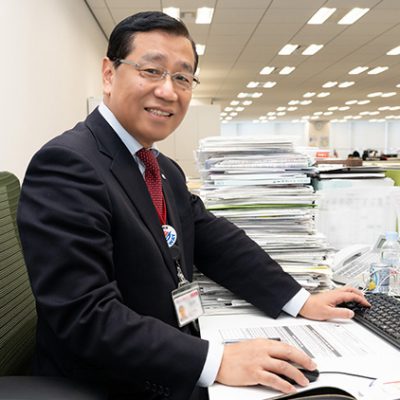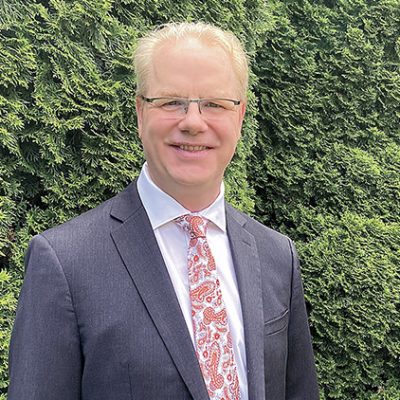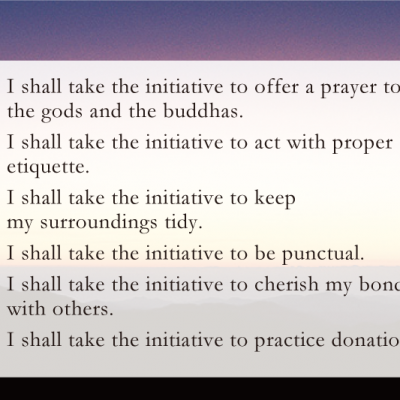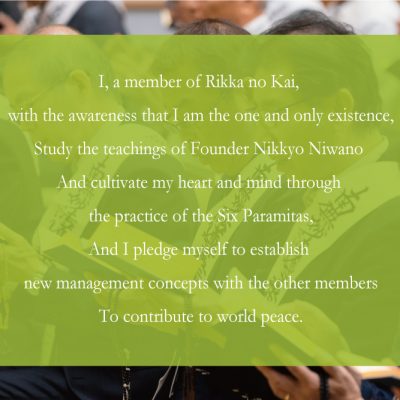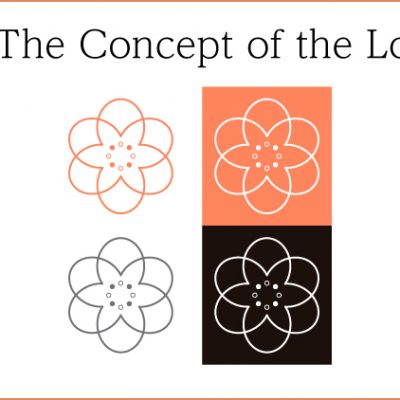08.04
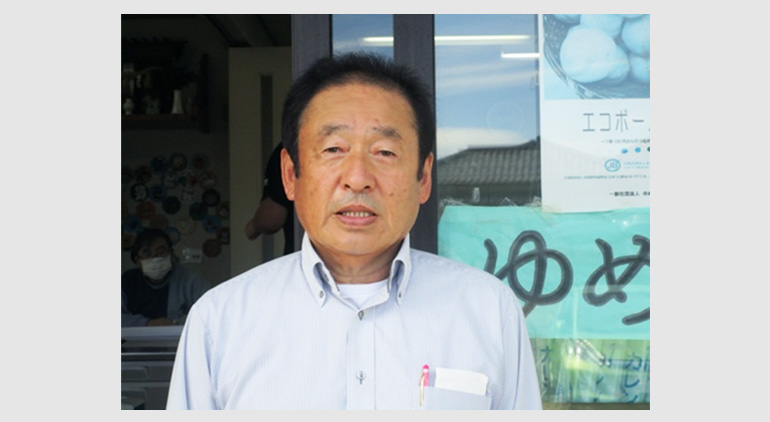
Serving Others Through Work
Takaoka Dharma Center
Masashi Nakayama
This Dharma Journey talk originally appeared in Japanese in the February 2021 issue of Kosei, a monthly magazine published by Kosei Publishing.
It has been eighteen years since I started my present company, handling the production and sales of textile goods. Before that, I worked for twenty-six years in sales for a wholesale company handling textile products. Before I realized it, forty-four years had passed since I placed myself in this area of business.
My former company distributed garment products such as zip fasteners, sewing threads, and buttons to apparel manufacturers. It was a small company with fifteen employees. My various jobs were challenging and I enjoyed working in a vibrant work environment.
When I was forty-one years old, seventeen years after joining the company, I became a sales manager who supervised the company’s employees as well as our products’ wholesalers and retailers. Soon after that, at the suggestion of my wife, Etsuko, I began to take part in men’s group activities at Rissho Kosei-kai’s Takaoka Dharma Center.
I joined hoza (the Dharma circle in which we share our experiences in everyday life and learn from each other in light of the Buddha’s teachings) and tedori (visiting other members’ homes to enhance their connection with the Dharma). While joining such activities and seeing sangha members intently listening to other members’ talks, I began to look back on my attitudes toward my fellow workers.
Later, following the collapse of Japan’s bubble economy and the subsequent recession, our client companies in the apparel industry went bankrupt one after another. Orders for our products gradually decreased.
When our company’s sales deteriorated, the president, who had always had a gentle and calm demeanor, suddenly changed. He stopped greeting anyone in the office, and instead of speaking directly to his employees, he handed them notes containing his instructions. In addition, he rebuked employees harshly when they made a mistake, but stopped giving words of praise when someone achieved a good result. The employees grew distrustful of him and there was a heavy atmosphere in the office.
What was going on in the office was hard for me to bear, so I shared it with Rev. Yuji Numata (the minister of our Dharma center who is now Rissho Kosei-kai’s advisor on Dharma dissemination) during a hoza session for men’s group one evening.
Rev. Numata told me, “Someone always places flowers in my room of the Dharma center. Every morning, I greet the flowers, even though I know they won’t respond. Similarly, you can greet your president on your own initiative. Your company’s president passes notes to his employees—it’s hard to find such a kind and careful president. Every person has his or her own concerns or ways of dealing with things. Mr. Nakayama, you’d be able to serve as lubricant between your president and the employees, wouldn’t you?”
Rev. Numata’s advice was eye-opening for me, as I believed the president to be wholly responsible for the company’s financial situation and the heavy atmosphere in the workplace. I put the blame on him. Rev. Numata suggested, however, that I should try a different way of looking at him: seeing him as a kind and careful person.
Beginning the next day, I made it a habit to greet the president cheerfully. Even though he didn’t respond, being able to say hello to him from my heart gradually became a joy for me. Moreover, when I looked at him without a prejudiced eye, I remembered that he always came to work earlier than everyone else to clean the office. I realized that the president was hoping to make the company a comfortable place for his employees to work—this is why he tirelessly did the morning cleaning all by himself.
So, I began going to the office early to clean the office with him. When the president thanked me, I felt the spiritual distance between us begin to disappear. During an employees’ morning meeting, I expressed my gratitude for the president for cleaning the office every morning because I hoped that, as Rev. Numata had told me, I could serve as the lubricant between the president and the employees. Everyone there looked surprised to learn that the president, who was so stern and harsh, was cleaning the office every morning.
Through the men’s group activities, I learned that “if I change, others will change.” By seeing what happened in our workplace, I was convinced that this teaching was true. From that point on, the company’s heavy atmosphere began to regain its former brightness.
On the other hand, however, the company’s financial status was growing worse. One morning in late September 2002, I went in to the office to find a notice on the entrance door saying the company had gone bankrupt. In a corner of my mind, I’d expected that this might happen someday, but it still felt so sudden that I could only stand there, motionless, for a while. Soon after, I began to receive a rush of calls on my cell phone from clients and creditors asking the whereabouts of the president. My entire morning was totally occupied with answering these calls.
The company’s bankruptcy caused concern to many creditors and customers. As the sales manager, I made up my mind to visit them one by one to make apologies. I thought it was my duty.
That afternoon, I visited the Dharma center and told Rev. Numata what was on my mind. He listened to me and gave me a supportive push, saying I should visit them with a sincere heart. As the proverb goes, “there is no time like the present,” so, soon after I left the Dharma center, I started to visit some three hundred creditors and customers all over Toyama Prefecture.
“I am very sorry for the trouble we have caused you,” I said to each of them, looking into their eyes and apologizing to them from my heart. Also, hoping that I could help ease the negative effects that our bankruptcy had on them, I listened intently to what they had to say. Some said they needed materials for their products, which our company had supplied, so I helped them get the same materials from other companies in the city. I tried my best to be responsive to every request.
To my surprise, few clients complained—on the contrary, many people were kindly concerned about my future employment. One even offered to support me in starting my own company. I was filled with gratitude.
As I looked back on the years before the bankruptcy, I realized that I had rested safely in my position as sales manager and dealt with every day’s work through the force of habit. Buddhism teaches the Six Perfections as the ways of serving others, but I was doing the opposite. I thought, conceitedly, that I was helping our clients by doing business with them, and eventually I came to have little respect toward them. I was also one of the employees who held anger toward the president.
With this awareness, I came to accept that the bankruptcy and my subsequent visits to the clients to apologize, which lasted a month, were lessons that the Buddha arranged for me so I could reflect on my way of living and my attitude toward work.
When my visits to the clients were over, I thought, I hope to repay the kind concern for my future that I received from many people.
My desire to start my own company grew strong, and I had my wish heard by Rev. Numata, who gave me all sorts of advice, including practical suggestions about budgeting and renting an office.
As I was also in charge of purchasing sewing threads and buttons in my former job, I visited one of the companies with which I did business and asked to wholesale their products. My request was not accepted as I didn’t have enough funds, but they kindly introduced me to their subsidiary company in Kanazawa City, with which I was able to make a contract to use their products to produce and retail textile goods as a sole proprietor.
Also, the president of another company with which I’d done business before said to me, “You can use our warehouse as you please—we aren’t using it right now,” and leased their warehouse to me. I decided to use it as an office and storage facility. Thanks to these kind offers and arrangements, I was able to establish my own company.
Two months after the bankruptcy, I started my business handing the wholesale and retailing of textile goods, including sewing threads and buttons, and the production and sales of pillow cases, waterproof sheets for hospitals, and napkins for hotels. At that time, I promised myself two things: I will make myself available for my customers’ needs as best as I can, and I will never miss a delivery date.
I made it a rule to positively communicate with my customers. I talked with them not only about business but also about life in general, and I listened to their problems. When I heard that someone’s old sewing machine broke, I found a dealer who could repair it. When I was asked if we could make children’s clothes, I introduced a manufacturer of children’s clothes.
I also volunteered to help my customers change light bulbs in their offices and change the layout of the workplace. I was happy to be able to please my customers, and to my further joy, the customers sometimes introduced me to other clients. I soon realized the importance of building ties with other people.
In December 2018, when my business was starting to take off, I had an opportunity to study the principles for being a good business owner and having a proper work style. This was during the first meeting of the Gathering for Business Owners to Study the Spirit of Buddhism, held in the Great Sacred Hall at Rissho Kosei-kai’s headquarters in Tokyo.
Under the impactful theme “Be Earnest to Change the Future,” Rissho Kosei-kai’s sangha members across the country who were running businesses gathered for the meeting. The participants studied the essentials of business management by hearing from a member who rehabilitated a company after financial difficulties. We also learned from one another in group discussions.
I participated in the gathering without expecting anything in particular from it, but I felt my eyes open as I learned of other participants’ aspirations to apply Buddhism to management and contribute to society. I had thought vaguely that I would like to help others through my business, but hearing others talk, I keenly recognized the importance of donation, the practice of giving, which is the first element of the Six Perfections.
I also remembered Founder Nikkyo Niwano’s words from Buddhism for Everyday Life, which I always tried to keep in mind: “Sincerity and kindness are two forces that will always win recognition in the long run and wield great influence.”
I recognized anew the importance of practicing donation with a sincere and kind heart.
In order to put what I’d learned at the gathering into practice, I made three resolutions to myself. First, I would recite the sutra every morning and evening. Second, I would practice the Six Perfections (donation in particular). And third, as a business owner, I would control my selfishness and cultivate the mind of serving others.
I think my mind has become organized through the practice of sutra recitation, and by always being conscious of practicing donation, I’ve also become able to interact with my customers more sincerely than before.
Because of the coronavirus catastrophe, a part of my job is temporarily lost, but I’ve begun receiving orders from new customers, which keep me busy every day. I’ve become keenly aware that any part of my work cannot be done by me alone. My work is possible thanks to the support of all the people who purchase the materials and textile goods my company produces, who use the material to manufacture textile products such as bed sheets for hospitals, and who purchase the products and use them.
I pledge to always be conscious of serving others and continue to be diligent in the bodhisattva practice, making it the basis of my work.




